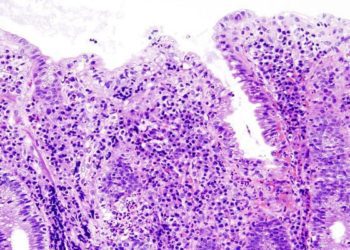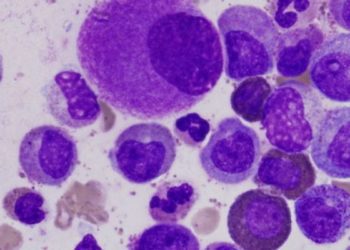Ustekinumab linked with efficacy in treatment of Crohn’s disease: The UNITI-1 & 2, IM-UNITI trials
1. Ustekinumab achieved successful clinical induction in a greater proportion of patients with moderate to severe Crohn’s disease (CD) compared to placebo in two separate lead-in induction randomized controlled trials.
2. In a separate randomized controlled study, subcutaneous ustekinumab was linked with successful maintenance of remission of CD in ustekinumab-responders from the induction trials.
Evidence Rating Level: 1 (Excellent)
Study Rundown: Ustekinumab is a monoclonal antibody targeted at the p40 subunit of interleukin-12 and interleukin-23, which has been approved for use in the treatment of psoriasis and psoriatic arthritis. In this combination of randomized controlled studies, the authors report the efficacy and safety of ustekinumab in the induction and maintenance of therapy for patients with moderate to severe CD. UNITI-1 and UNITI-2 involved patients with CD who had previously shown primary or secondary nonresponse or had developed unacceptable side effects to approved tumor necrosis factor (TNF) antagonists and patients who had experienced treatment failure on conventional therapy. Patients were randomized to receive a one-time intravenous dose of ustekinumab or placebo and were followed for clinical response. In IM-UNITI, ustekinumab responders from the first 2 trials were randomized to receive subcutaneous ustekinumab therapy or placebo.
In all, the authors report significant improvements in clinical response in the ustekinumab groups compared to placebo in both the induction and maintenance trials. The trial draws strength from its large sample and randomized, controlled design, which will help promote the use of ustekinumab in patients with CD who have experienced treatment failure or unacceptable side effects on TNF antagonists or conventional therapy. However, the complicated intermixing of ustekinumab responders from two separate induction trials raises concern for a heavily selected intervention population, limiting real world applicability. The lack of increased safety events in the intervention groups is promising but future research must continue surveillance for a longer follow-up period.
Click to read the study, published today in NEJM
Relevant Reading: Ustekinumab induction and maintenance therapy in refractory Crohn’s disease
In-Depth [randomized controlled trial]: This randomized, controlled trial involved 741 and 628 patients with moderately to severely active CD from UNITI-1 and UNITI-2, respectively. In the induction phases, patients were randomized to receive ustekinumab at a dose of 130mg or 6mg per kilogram of body weight compared to placebo. The primary outcome at week 6 was clinical response, defined as a decrease of ≥100 points from baseline in the Crohn’s Disease Activity Index (CDAI) or a CDAI score <150. In UNITI-1, the rates of satisfying the primary outcome among patients receiving the fixed or weight-based dose of ustekinumab were 34.4% and 33.7% compared to 21.5% in the placebo group (p ≤ 0.003 for both comparisons with placebo); in UNITI-2 the respective rates were 51.7%, 55.5%, and 28.7% (p < 0.001 for both doses). In the maintenance phase of IM-UNITI, patients who had had a significant clinical response to ustekinumab induction therapy were randomized to receive subcutaneous injections of 90mg of ustekinumab every 8 or 12 weeks, compared to placebo, for a total of 40 weeks. The primary end point of the maintenance phase was clinical remission at week 44, defined as a CDAI score <150; the rates of satisfying this endpoint were 53.1%, 48.8%, and 35.9% in the 8- and 12-week ustekinumab and placebo groups, respectively (p = 0.005 and p = 0.04, respectively). These results were mirrored in declines in surrogate biomarker endpoints, including change in C-reactive protein and fecal calprotectin from baseline. The adverse-event rates were similar among treatment groups in the induction and maintenance trials, though it should be noted that there were high rates of at least one adverse event in all groups in the maintenance trial (greater than 80% in all groups).
Image: CC/Wiki
©2016 2 Minute Medicine, Inc. All rights reserved. No works may be reproduced without expressed written consent from 2 Minute Medicine, Inc. Inquire about licensing here. No article should be construed as medical advice and is not intended as such by the authors or by 2 Minute Medicine, Inc.





![Engineered stem cells mitigate liver damage caused by radiation [PreClinical]](https://www.2minutemedicine.com/wp-content/uploads/2014/12/Human_embryonic_stem_cells-75x75.png)


